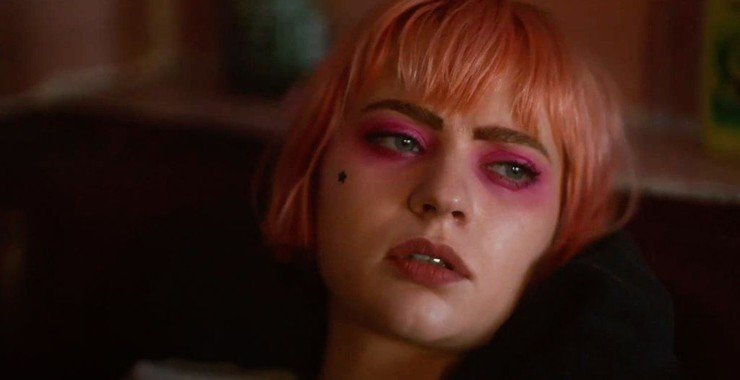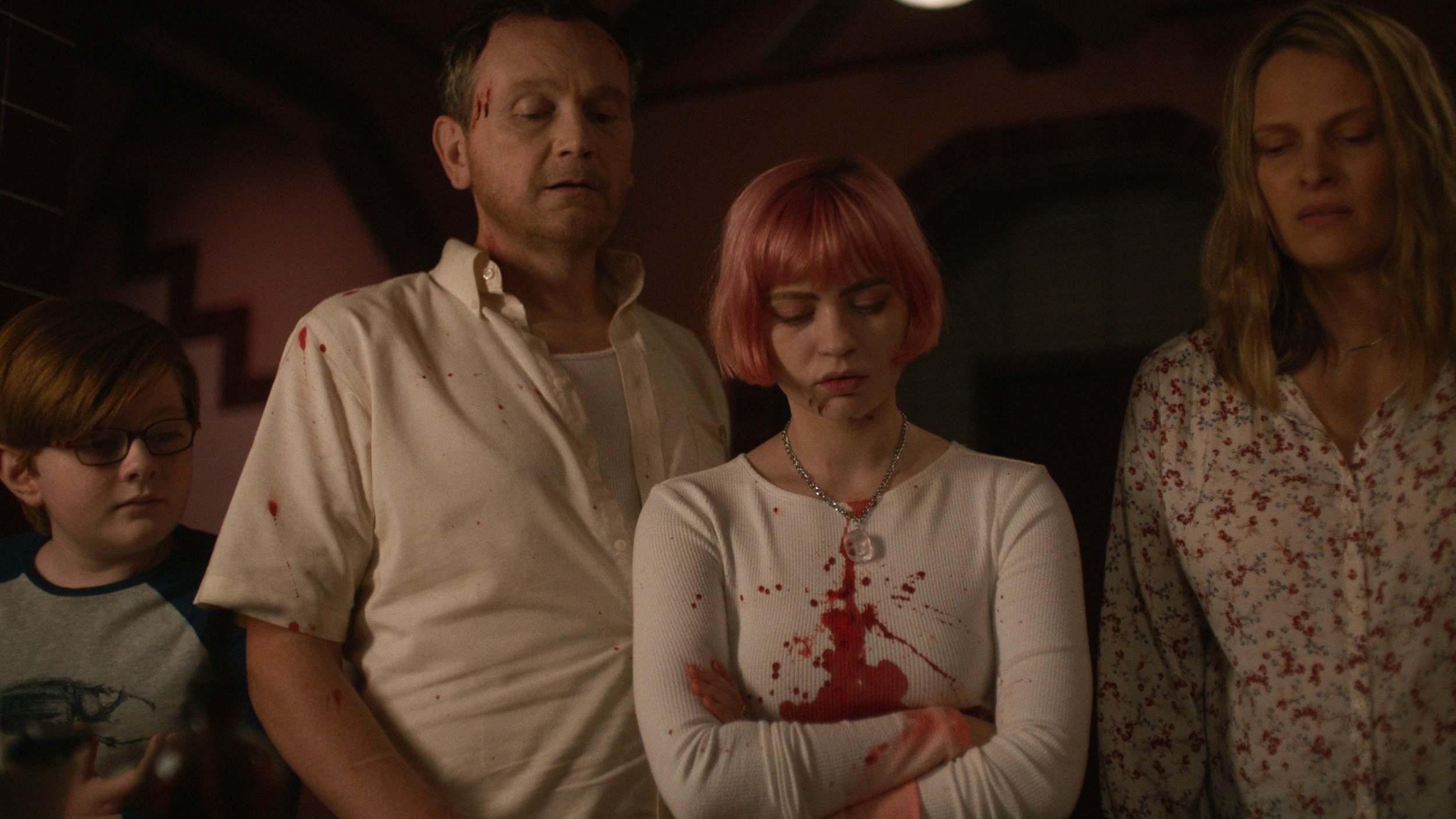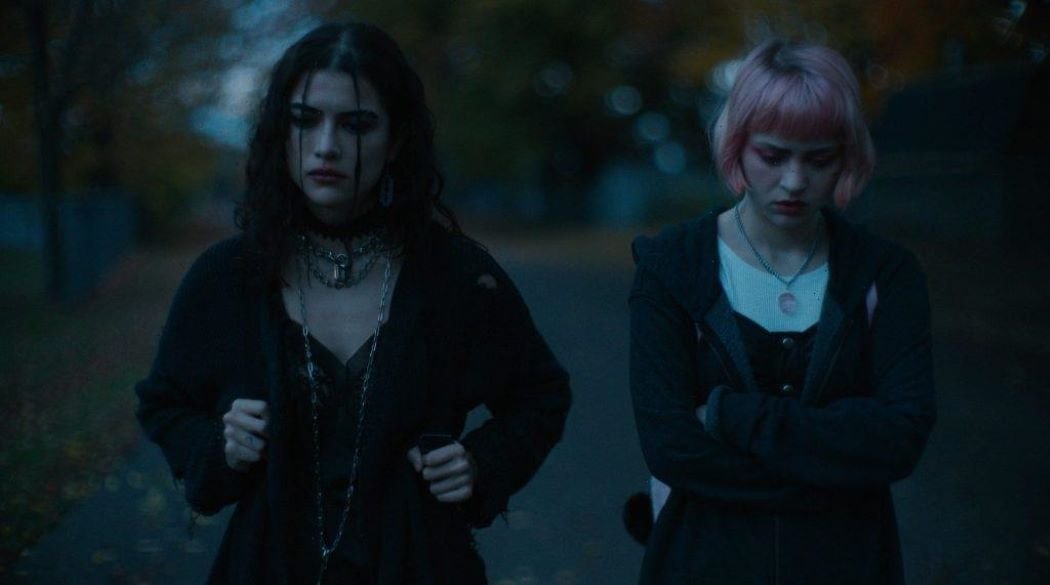[Editorial] Celluloid Screams: Interview with Max Booth III writer of We Need to Do Something

I was lucky enough to catch up with screenwriter Max Booth III of We Need to Do Something at this years Celluloid Screams: Sheffield Horror Festival. You can find my review of the film here.
Hannah (Interviewer): When I was watching the film, I was struck with the idea of when you are growing up and you realise that your parents are just normal people, they are no longer heroes, they are fallible. Was that something that inspired you?
Max Booth III (Screenwriter): Yes, I think there is a moment with every kid when they realise “Oh my family are just humans”, they also fuck up. With my moment, when I was twelve, we lost the family house due to the - this is going to get gloomy!
H: Straight away I have gone for the very deep question!
M: My mum was a gambling addict and we lost the house. We moved into the hotel that was by the casino as we would get comped rooms. So we lived in that hotel until the comps ran out and then moved to a shitty hotel close by and I didn’t go to school and I didn’t see anyone. I was just in a hotel room with my mum and my dad would go to work and that was kind of the moment, these folks aren’t so perfect.
H: We have your history of being stuck in a hotel room and our characters in We Need to Do Something being stuck in the family bathroom…
M: Yes that’s funny because I have written lots of books that take place in one setting and I am obsessed with it. But only recently I kind of looked back and think “Oh shit, that’s why I always write about that huh?”. Most of my stuff deals with dysfunctional families which I couldn’t imagine why! The parents in the book, in the screenplay are not exactly like my own parents, it was more my mum who was more the villain. But I have grown up knowing dysfunctional families - I mean its just what I know so it seems to feature in my fiction quite a bit.

H: How did the idea around adding this story into the supernatural and witchcraft come about?
M: I wrote this originally as a screenplay before I wrote it as a book because a friend of mine named Shane McKenzie, he wrote Bingo Hell (2021) which just came out, him and I we get together – he used to write books but now he does screenplays and he got with me and said “Max, there is no money in books – write a screenplay” and I said “I don’t know how to do that Shane!” and he encouraged “Easy just do it and I will help you find someone”. I already had the idea to write something set in the bathroom then when he suggested this movie thing I thought that would have a low budget as its set in one setting. I wrote it and sent to Shane - he sent it to a few indie companies that he knew - no one responded. I got really impatient. I said to Shane “I am no screenplay writer, I am going to rewrite this as a novella.” And he said “Alright, I am not your mum – you can do what you want!”.
I wrote it as a novella and re-looking at the script and wondering what I could do differently now I wasn’t concerned about a budget. In the original screenplay we have that monologue towards the end when Melissa (the daughter) is like ‘I was fucking around on Reddit and I did some witchcraft’. I don’t know what attracts me to witch craft in movies but I do like it a lot. And I love it when people do dumb things online because it feels realistic to me. I kept thinking what kind of witchcraft could she have done because in the original script it was super vague as I didn’t know much about witch craft. With the novella I did a lot of research into different spells and different old occultist books from the 1600s. I found some spells which tied into what was going on in the book.
H: Witchcraft is mainly practiced by women - in the novella and screenplay, did you always have Melissa being the driving force for the plot?
M: In the original screenplay it was way more vague of who was responsible, as I didn’t have a main character in mind. It didn’t occur to me until I started writing the book and thought ‘whose point of view am I writing from’ and then it came pretty quickly that Melissa was obviously the main driving force of the story. I re-approached from that point of view and it helped flesh out the story further.

H: Does Melissa look like what you imagined her looking? As she has that ‘e-girl’ vibe with the pink hair and heavy blush.
M: I didn’t have any of that in mind. I usually don’t imagine what the characters look like, just a teenager. But I do like how she looks in the movie. One day Sean (King O’Grady, Director) sent me photos of the cast.
H: I loved the dialogue, really sniping and quick witted. Managing to find that balancing the serious darkness with comedy. Is that something that comes natural to you?
M: It just came to me, its how I usually write. I thought a lot about how comedy and the horror genre can balance each other. I think it has a rhythm to it, meaning if you have something serious going on – it can be a good time to throw in a laugh as no one is expecting a laugh during a tense moment. Vice versa, if everyones laughing and then something fucked up happens, they don’t know how to respond. Both genres are the only 2 which have an audible effect in the audience, either a scream or a laugh. Like with a drama you don’t really make a noise. Even if you are watching the audience – you can’t tell if a drama is really effecting them. But with a comedy you know its working with laughing or if it’s a horror then hopefully you get a jump.
WE TALK ABOUT SPOILERS GOING FORWARD SO THIS IS YOUR WARNING!
H: Bobby, sweet innocent bobby. Why did you choose him?
M: Because he is the innocent one. At the time it seemed right. Bobby is heavily based off my stepson who was the same age and my step son is really interested by Tornados also. He was sitting by me as I was writing the original screenplay and he was really fascinated by it all. A piece of dialogue which is kept from the original screenplay is where Bobby is explaining what EF5 tornado is is my step son’s own words. He stopped watching me write it once Bobby died though, he was like “That’s rude!”.
H: Seeing as you wrote one, what is your favourite end of the world film?
M: I’ll say Day of the Dead (1985) – also a one setting movie that takes place underground.
When people think of horror films, slashers are often the first thing that comes to mind. The sub-genres also spawned a wealth of horror icons: Freddy, Jason, Michael, Chucky - characters so recognisable we’re on first name terms with them. In many ways the slasher distills the genre down to some of its fundamental parts - fear, violence and murder.
Throughout September we were looking at slasher films, and therefore we decided to cover a slasher film that could be considered as an underrated gem in the horror genre. And the perfect film for this was Franck Khalfoun’s 2012 remake of MANIAC.
In the late seventies and early eighties, one man was considered the curator of all things gore in America. During the lovingly named splatter decade, Tom Savini worked on masterpieces of blood and viscera like Dawn of the Dead (1978), a film which gained the attention of hopeful director William Lustig, a man only known for making pornography before his step into horror.
Looking for some different slasher film recommendations? Then look no fruther as Ariel Powers-Schaub has 13 non-typical slasher horror films for you to watch.
Even though they are not to my personal liking, there is no denying that slasher films have been an important basis for the horror genre, and helped to build the foundations for other sub-genres throughout the years.
But some of the most terrifying horrors are those that take place entirely under the skin, where the mind is the location of the fear. Psychological horror has the power to unsettle by calling into question the basis of the self - one's own brain.
On Saturday, 17th June 2023, I sat down with two friends to watch The Human Centipede (First Sequence) (2009) and The Human Centipede 2 (Full Sequence) (2012). I was nervous to be grossed out (I can’t really handle the idea of eating shit) but excited to cross these two films off my list.
Many of the most effective horror films involve blurring the lines between waking life and a nightmare. When women in horror are emotionally and psychologically manipulated – whether by other people or more malicious supernatural forces – viewers are pulled into their inner worlds, often left with a chilling unease and the question of where reality ends and the horror begins.
Body horror is one of the fundamental pillars of the horror genre and crops up in some form or another in a huge variety of works. There's straightforward gore - the inherent horror of seeing the body mutilated, and also more nuanced fears.
In the sweaty summer of 1989, emerging like a monochrome migraine from the encroaching shadow of Japan’s economic crash, Shin’ya Tsukamoto’s Tetsuo: The Iron Man shocked and disgusted the (very few) audiences originally in attendance.
Whether it's the havoc wreaked on the human body during pregnancy, emotional turmoil producing tiny murderous humans or simply a body turning on its owner, body horror films tend to be shocking. But while they're full of grotesque imagery, they're also full of thoughtful premises and commentary, especially when it comes to women, trauma, and power.

RELATED ARTICLES
Possessor is a slick futuristic thriller in which Tasya Vos, an assassin for hire, must manage her responsibilities as an elite killing machine and complex feelings towards her husband and son, whilst taking on another high-profile job that will push her to the edge of her sanity.
Sara is a woman condemned from the start, first because of her religious beliefs…
The Babadook is a 2014 psychological horror, the directorial debut of Jennifer Kent…
Helen Lyle is a triple threat. She is smart, charismatic and tenacious. An innovative researcher who wants to push the envelope. ..
When James Wan’s The Conjuring (2013) was first released, it set the tone for 2010s horror and was regarded by some horror fans as the beginning of a renaissance for the genre…
Sara is host of a failing web series entitled Encounters which shows her meeting a range of offbeat people through personal ads…
It’s not wholly obvious in the first thirty minutes of Tobe Hooper’s The Texas Chainsaw Massacre just who our final girl will be…
Filmdom’s conventional wisdom in the mid-20th Century decreed that horror was no place for a lady. That is, unless it was as a shrieking victim dressed in a bosom-baring, diaphanous nightie…
When reassessing The Exorcist, there are implications of abuse brought on by Chris MacNeil’s reluctance to be a proper ‘mother’ to Regan…
Everyone must play, no outsiders allowed, nobody leaves.
Mary Harron’s American Psycho has had a strange and convoluted path to its current position as a lauded part of the American horror canon…

EXPLORE
Now it’s time for Soho’s main 2023 event, which is presented over two weekends: a live film festival at the Whirled Cinema in Brixton, London, and an online festival a week later. Both have very rich and varied programmes (with no overlap this year), with something for every horror fan.
In the six years since its release the Nintendo Switch has amassed an extensive catalogue of games, with everything from puzzle platformer games to cute farming sims to, uh, whatever Waifu Uncovered is.
A Quiet Place (2018) opens 89 days after a race of extremely sound-sensitive creatures show up on Earth, perhaps from an exterritorial source. If you make any noise, even the slightest sound, you’re likely to be pounced upon by these extremely strong and staggeringly fast creatures and suffer a brutal death.
If you like cults, sacrificial parties, and lesbian undertones then Mona Awad’s Bunny is the book for you. Samantha, a student at a prestigious art university, feels isolated from her cliquey classmates, ‘the bunnies’.
The slasher sub genre has always been huge in the world of horror, but after the ‘70s and ‘80s introduced classic characters like Freddy Krueger, Michael Myers, Leatherface, and Jason, it’s not harsh to say that the ‘90s was slightly lacking in the icon department.
Mother is God in the eyes of a child, and it seems God has abandoned the town of Silent Hill. Silent Hill is not a place you want to visit.
Being able to see into the future or back into the past is a superpower that a lot of us would like to have. And while it may seem cool, in horror movies it usually involves characters being sucked into terrifying situations as they try to save themselves or other people with the information they’ve gleaned in their visions.
Both the original Pet Sematary (1989) and its 2019 remake are stories about the way death and grief can affect people in different ways. And while the films centre on Louis Creed and his increasingly terrible decision-making process, there’s no doubt that the story wouldn’t pack the same punch or make the same sense without his wife, Rachel.


![[Editorial] 5 Slasher Short Horror Films](https://images.squarespace-cdn.com/content/v1/5fe76a518d20536a3fbd7246/1696358009946-N8MEV989O1PAHUYYMAWK/Screenshot+2023-10-03+at+19.33.19.png)
![[Ghouls Podcast] Maniac (2012) with Zoë Rose Smith and Iona Smith](https://images.squarespace-cdn.com/content/v1/5fe76a518d20536a3fbd7246/1696356006789-NYTG9N3IXCW9ZTIJPLX2/maniac.jpg)
![[Editorial] If Looks Could Kill: Tom Savini’s Practical Effects in Maniac (1980)](https://images.squarespace-cdn.com/content/v1/5fe76a518d20536a3fbd7246/1694952175495-WTKWRE3TYDARDJCJBO9V/Screenshot+2023-09-17+at+12.57.55.png)
![[Editorial] Deeper Cuts: 13 Non-Typical Slashers](https://images.squarespace-cdn.com/content/v1/5fe76a518d20536a3fbd7246/1694951568990-C37K3Z3TZ5SZFIF7GCGY/Curtains-1983-Lesleh-Donaldson.jpg)
![[Editorial] Editor’s Note: Making a slash back into September](https://images.squarespace-cdn.com/content/v1/5fe76a518d20536a3fbd7246/1694354202849-UZE538XIF4KW0KHCNTWS/MV5BMTk0NTk2Mzg1Ml5BMl5BanBnXkFtZTcwMDU2NTA4Nw%40%40._V1_.jpg)
![[Editorial] 8 Mind Horror Short films](https://images.squarespace-cdn.com/content/v1/5fe76a518d20536a3fbd7246/1693504844681-VPU4QKVYC159AA81EPOW/Screenshot+2023-08-31+at+19.00.36.png)
![[Editorial] Eat Shit and Die: Watching The Human Centipede (2009) in Post-Roe America ](https://images.squarespace-cdn.com/content/v1/5fe76a518d20536a3fbd7246/1691245606758-4W9NZWE9VZPRV697KH5U/human_centipede_first_sequence.original.jpg)
![[Editorial] Top 15 Female-Focused Mind Horror Films](https://images.squarespace-cdn.com/content/v1/5fe76a518d20536a3fbd7246/1691247166903-S47IBEG7M69QXXGDCJBO/Image+5.jpg)
![[Editorial] 8 Body Horror Short films](https://images.squarespace-cdn.com/content/v1/5fe76a518d20536a3fbd7246/1690838270920-HWA5RSA57QYXJ5Y8RT2X/Screenshot+2023-07-31+at+22.16.28.png)
![[Editorial] Metal Heart: Body Dysmorphia As A Battle Ground In Tetsuo: The Iron Man (1989)](https://images.squarespace-cdn.com/content/v1/5fe76a518d20536a3fbd7246/1690190127461-X6NOJRAALKNRZY689B1K/Screenshot+2023-07-24+at+10.08.27.png)
![[Editorial] Top 15 Female-Focused Body Horror Films](https://images.squarespace-cdn.com/content/v1/5fe76a518d20536a3fbd7246/1689081174887-XXNGKBISKLR0QR2HDPA7/download.jpeg)
![[Editorial] In Her Eyes: Tasya Vos in Possessor (2020)](https://images.squarespace-cdn.com/content/v1/5fe76a518d20536a3fbd7246/1667061747115-NTIJ7V5H2ULIEIF32GD0/Image+1+%285%29.jpg)
![[Editorial] In Her Eyes: Sara Lowes in Witchfinder General (1968)](https://images.squarespace-cdn.com/content/v1/5fe76a518d20536a3fbd7246/1655655953171-8K41IZ1LXSR2YMKD7DW6/hilary-heath.jpeg)
![[Editorial] The Babadook (2014)](https://images.squarespace-cdn.com/content/v1/5fe76a518d20536a3fbd7246/1651937631847-KR77SQHST1EJO2729G7A/Image+1.jpg)
![[Editorial] In Her Eyes: Helen Lyle in Candyman (1992)](https://images.squarespace-cdn.com/content/v1/5fe76a518d20536a3fbd7246/1649586854587-DSTKM28SSHB821NEY7AT/image1.jpg)
![[Editorial] Lorraine Warren’s Clairvoyant Gift](https://images.squarespace-cdn.com/content/v1/5fe76a518d20536a3fbd7246/1648576580495-0O40265VK7RN03R515UO/Image+1+%281%29.jpg)
![[Editorial] Sara in Creep 2 (2017)](https://images.squarespace-cdn.com/content/v1/5fe76a518d20536a3fbd7246/1646478850646-1LMY555QYGCM1GEXPZYM/27ebc013-d50a-4b5c-ad9c-8f8a9d07dc93.jpg)
![[Editorial] Sally Hardesty in The Texas Chainsaw Massacre (1974)](https://images.squarespace-cdn.com/content/v1/5fe76a518d20536a3fbd7246/1637247162929-519YCRBQL6LWXXAS8293/the-texas-chainsaw-final-girl-1626988801.jpeg)
![[Editorial] Margaret Robinson: Hammer’s Puppeteer](https://images.squarespace-cdn.com/content/v1/5fe76a518d20536a3fbd7246/1630075489815-33JJN9LSGGKSQ68IGJ9H/MV5BMjAxMDcwNDI2Nl5BMl5BanBnXkFtZTcwOTMxODgzMQ%40%40._V1_.jpg)
![[Editorial] Re-assessing The Exorcist: Religion, Abuse, and The Rise of the Feminist Mother.](https://images.squarespace-cdn.com/content/v1/5fe76a518d20536a3fbd7246/1629995626135-T5K61DZVA1WN50K8ULID/image2.jpg)
![[Editorial] Unravelling Mitzi Peirone’s Braid (2018)](https://images.squarespace-cdn.com/content/v1/5fe76a518d20536a3fbd7246/1628359114427-5V6LFNRNV6SD81PUDQJZ/4.jpg)
![[Editorial] American Psycho (2000)](https://images.squarespace-cdn.com/content/v1/5fe76a518d20536a3fbd7246/1627317891364-H9UTOP2DCGREDKOO7BYY/american-psycho-bale-1170x585.jpg)





















![[Editorial] 10 Films & Events to Catch at Soho Horror Film Fest 2023](https://images.squarespace-cdn.com/content/v1/5fe76a518d20536a3fbd7246/1700819417135-299R7L4P0B676AD3RO1X/Screenshot+2023-11-24+at+09.41.52.png)
![[Editorial] 9 Horror Nintendo Switch Games To Play](https://images.squarespace-cdn.com/content/v1/5fe76a518d20536a3fbd7246/1697214470057-3XZXX8N4LYIMDFWS6Z3P/Screenshot+2023-10-13+at+17.20.13.png)
![[Mother of Fears] Mothering in Silence in A Quiet Place (2018)](https://images.squarespace-cdn.com/content/v1/5fe76a518d20536a3fbd7246/1696445921315-HZJ2DZYQIH6VVWXBO2YL/Screenshot+2023-10-04+at+19.52.29.png)
![[Editorial] 5 Female Focused Horror Book Recommendations](https://images.squarespace-cdn.com/content/v1/5fe76a518d20536a3fbd7246/1696441981361-52EQCTJ7AT2QF1927GM7/919xtm6d3fL._AC_UF894%2C1000_QL80_.jpg)
![[Editorial] 9 Best Slashers Released Within 10 Years of Scream (1996)](https://images.squarespace-cdn.com/content/v1/5fe76a518d20536a3fbd7246/1695478839037-LOFHGVM3H6BMSZW7G83M/Screenshot+2023-09-23+at+15.15.11.png)
![[Mother of Fears] Mother Vs. Monster in Silent Hill (2006)](https://images.squarespace-cdn.com/content/v1/5fe76a518d20536a3fbd7246/1695485781119-H6GNP0G3J2TLPAOIABV7/Screenshot+2023-09-23+at+17.11.56.png)
![[Editorial] 9 Terrifying Cerebral Visions in Horror Movies](https://images.squarespace-cdn.com/content/v1/5fe76a518d20536a3fbd7246/1693509801235-X23OL50T1DVGECH0ZJK2/MV5BMjQ0MTg2MjQ4MV5BMl5BanBnXkFtZTgwMTU3NDgxMTI%40._V1_.jpg)
![[Mother of Fears] I Don’t Wanna Be Buried in a Pet Sematary (1989) and (2019)](https://images.squarespace-cdn.com/content/v1/5fe76a518d20536a3fbd7246/1691328766069-QFNAVJOMFZVZ5CLU1RWM/Screenshot+2023-08-06+at+14.23.13.png)

I can sometimes go months without having a panic attack. Unfortunately, this means that when they do happen, they often feel like they come out of nowhere. They can come on so fast and hard it’s like being hit by a bus, my breath escapes my body, and I can’t get it back.